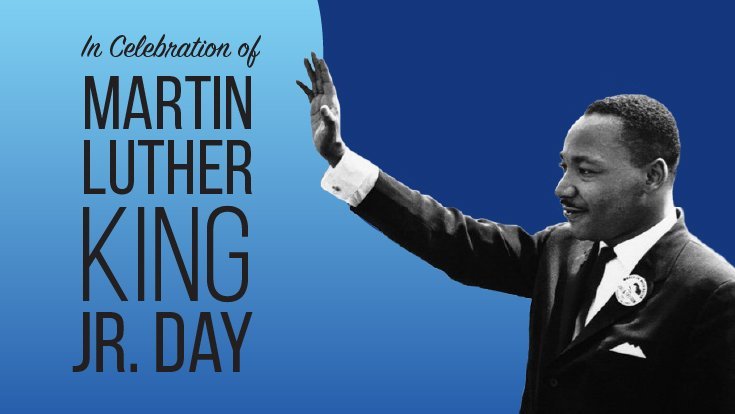Martin Luther King Jr. Day: A Day of Remembrance and Action
Today, on the third Monday of January, we celebrate Martin Luther King Jr. Day, a day to honor the extraordinary life and legacy of one of the most influential figures in American history.
His Story, Our Inspiration:
- Born in 1929, Martin Luther King Jr. became a Baptist minister and emerged as the most visible spokesperson for the Civil Rights Movement during the 1950s and 1960s.
- He championed nonviolent resistance as a powerful tool for social change, leading boycotts, marches, and demonstrations against racial segregation and discrimination.
- His iconic “I Have a Dream” speech at the March on Washington in 1963 remains a testament to his vision for a more just and equitable America.
- King’s unwavering commitment to justice earned him the Nobel Peace Prize in 1964, but his life was tragically cut short by assassination in 1968.
Beyond the Holiday:
Martin Luther King Jr. Day is not just a day off. It’s a call to action, a reminder to continue the fight for racial equality and social justice. We can honor Dr. King’s legacy by:
- Reflecting on his teachings: Reread his speeches, watch documentaries, and learn more about his philosophy of nonviolent resistance.
- Engaging in social justice: Volunteer with organizations working for racial equality, participate in peaceful protests, and speak out against injustice.
- Promoting educational equity: Support initiatives that provide quality education for all children, regardless of their background.
- Building bridges across communities: Participate in interfaith dialogues, cultural events, and other initiatives that foster understanding and respect between different groups.
Remember, change doesn’t happen overnight. It takes consistent effort, courage, and unwavering commitment to Dr. King’s ideals.
Let this Martin Luther King Jr. Day be a starting point for our own journeys towards a more just and equitable world. Every action, big or small, can contribute to the dream Dr. King so eloquently voiced.
In addition to the above, here are some specific ways you can observe Martin Luther King Jr. Day:
- Attend a church service or community event that celebrates Dr. King’s legacy.
- Visit a museum or historical site that tells the story of the Civil Rights Movement.
- Read books or watch movies about Dr. King’s life and work.
- Start a conversation with family and friends about racism and how we can combat it.
- Donate to a charity that supports racial justice or equality.
Let’s make Martin Luther King Jr. Day more than just a day off. Let’s make it a day of action, a day of remembrance, and a day of hope for a brighter future.
Delving Deeper into the Legacy of Martin Luther King Jr.

Beyond the headlines and iconic speeches, Martin Luther King Jr. was a complex and multifaceted figure. To truly understand his impact, let’s explore some lesser-known aspects of his life and legacy:
The Evolution of a Leader:
- While often associated with Baptist tradition, King’s social justice philosophy was deeply influenced by diverse thinkers like Mahatma Gandhi, Howard Thurman, and Reinhold Niebuhr. He continuously evolved, moving from assimilationist ideals to embracing more radical expressions of nonviolent resistance.
- Beyond the Montgomery Bus Boycott, King championed numerous crucial campaigns, including the Albany Movement, the Birmingham campaign, and the Selma to Montgomery marches, each showcasing his strategic brilliance and adaptability in the face of resistance.
Beyond Racial Equality:
- While most prominently remembered for his fight against racial discrimination, King also passionately advocated for economic justice, criticizing America’s “triple evils” of racism, poverty, and war. He championed labor rights, condemned the Vietnam War, and envisioned a socialist system guaranteeing basic human needs.
- His later years saw him grappling with internal divisions within the Civil Rights Movement, facing critiques from both moderates and radicals. His evolving stance on issues like Black Power reflects his constant search for effective strategies to achieve social change.
More Than Words:
- While King’s eloquence in speeches has secured his place in history, his brilliance extended beyond oratory. He was a prolific writer, penning books like “Stride Toward Freedom” and “Where Do We Go From Here: Chaos or Community?” offering profound insights into the challenges and possibilities of the times.
- His commitment to nonviolence wasn’t merely passive resistance. King strategically utilized media attention, mobilized faith communities, and engaged in sophisticated political negotiations, demonstrating his astute understanding of power dynamics.
A Legacy Still Evolving:
- King’s legacy continues to be debated and reinterpreted. While some criticize his compromises and complexities, others highlight his unwavering commitment to nonviolence and his ability to forge coalitions across racial and class lines.
- His dream of racial equality remains unfulfilled, and ongoing struggles against systemic racism, police brutality, and economic inequality necessitate a critical re-examination of his teachings and their application in the 21st century.
Martin Luther King Jr. was more than just a charismatic leader or a powerful speaker. He was a strategist, a theologian, a writer, and a man constantly wrestling with the complexities of racial injustice and the possibilities of a just society. By delving deeper into his life and legacy, we can gain a more nuanced understanding of his contributions and continue to draw inspiration for our own struggles for a more equitable world.
